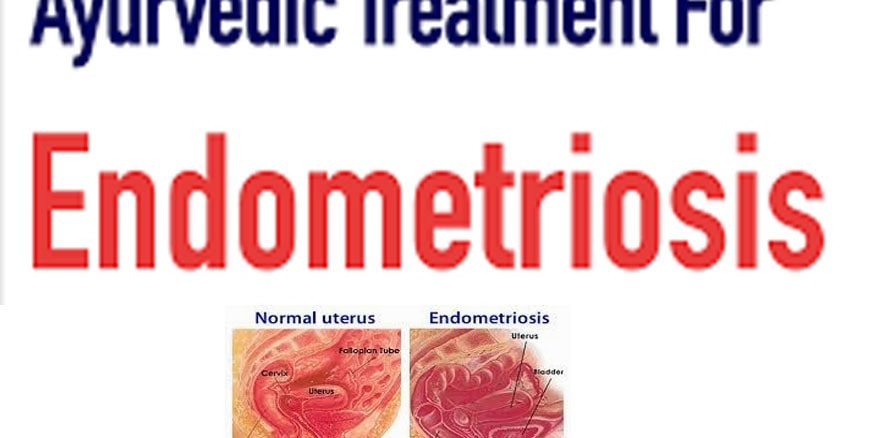Ayurvedic
Ayurvedic Treatment of Endometriosis | Beneficial in Disturbed menstruation, Dysmenorrhea, Hot flashes.
Table of Contents
Ayurvedic Treatment of Endometriosis:
Introduction: Endometriosis is defined as a chronic disease and the most common gynecological condition that can affect women in their reproductive years. The word endometriosis comes from the word ‘endometrium’ and is defined as the lining membrane of the uterus. “Endo” means inside, and “metra” means womb or uterus. Generally, the lining grows inside the uterus each month and then bleeds away during a menstrual cycle. The endometriosis condition arises when small pieces of endometrial tissues are seen in places outside the uterus that bleed into the peritoneal cavity and trigger severe, pain, local inflammation, and tenderness.
Causes of Endometriosis:
The exact cause of endometriosis is not known, but the following are some factors that are responsible for the development of this health condition:
- The upward flow of menstrual blood into the reproductive glands,
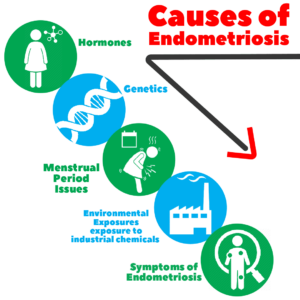
- Menstrual cycle issues,
- Exposure to industrial chemicals,
- Surgical scar implantation,
- Transportation of the endometrial cells,
- Hormone imbalances: Imbalance in the hormones is the major cause and in endometriosis, high levels of estrogen can be a causative factor.
Symptoms of Endometriosis:
Below-mentioned is some of the most common symptoms of endometriosis that can be experienced by women:
- Dysmenorrhea (severe menstrual cramps)
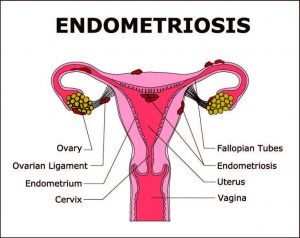
- Severe pain in the back and abdominal area during menstruations
- Mild to severe pain during bowel movement
- Heavy bleeding with mucus and clots
- In rare cases, difficulty getting pregnant (infertility)
- Stress, anxiety, and depression
- Other symptoms observed like a small lump in the umbilicus, general weakness, fatigue, and pain below the ribs
Ayurvedic View of Endometriosis:
According to the Ayurveda, all the three doshas – Vata, Pitta, and Kapha dosha is responsible for developing endometriosis as Vata dosha is responsible for the pain, Pitta dosha causes the imbalance inflow of blood, which leads to inflammation, Kapha dosha increases the build-up of endometrial cells.
Pathophysiology of Endometriosis in Ayurveda:
As per Ayurveda, all movements that occur in our body are due to Vata Dosha. Apana Vata is the type of vata and its functioning includes acts of defecation, urination, flatulence, the expulsion of the fetus during birth, and expulsion of blood during periods. When a woman does certain things in her diet/and lifestyle activities that imbalance the functioning of Apana Vata, then it starts moving upwards instead of downwards, thus this leads to cause menstruation blood to move upward in the pelvic cavity instead of coming out through the vagina.
As a result, endometrial (uterine lining) gets lodged on pelvic organs like the intestine, and ovaries, eventually, endometrium starts growing in abnormal places and starts bleeding during periods along with severe pain, and inflammation.
Panchakarma for Endometriosis:
Panchakarma therapies are not only beneficial as a treatment option but can also provide long-lasting health and rejuvenation benefits to an individual. In endometriosis, panchakarma serves as a holistic cleanse and works as the best option for the Ayurvedic treatment of Endometriosis. Medicated enema or purgation helps in the elimination of toxins and balances the aggravated doshas.
Uttar Basti for Endometriosis:
In this therapy, medicated enema is used to remove the endometrial growth and adhesion.
Importance of an Ayurvedic Diet and Lifestyle activities in Endometriosis:
A healthy diet plays a significant role in along with the Ayurvedic treatment of Endometriosis. In proper management and also for prevention, the main goal is to control and manage aggravated Vata Dosha. For patients with endometriosis, a diet rich in omega 3 fatty acids, and high fiber is a very good option. Also fresh and seasonal fruits and vegetables, nuts, and whole grains are the best choices to control the symptoms to some extent. Along with this, unhealthy diet and lifestyle activities should be strictly avoided.
Yoga for Endometriosis:
An expert believes that some specific yoga postures can have an amazing effect on managing and can be recommended as the Ayurvedic treatment of Endometriosis. Yoga like Pachimottanasana, Marjari Asana, Surya Namaskar, Shashankasana, and Setubandhasana can be done as a regular program for maintaining reproductive health and is beneficial in alleviating pelvic pain in women with endometriosis. A yoga activity encourages relaxation, and helps in managing stress, tension, and develops mindfulness.
Ayurvedic treatment of Endometriosis from Deep Ayurveda:
With the Ayurvedic herbs, endometriosis can be managed successfully because the Ayurvedic herbs rich in Vata balancing properties are very powerful in reversing the Apana Vata movement from upward to downwards. Deep Ayurveda provides the best Ayurvedic treatment of Endometriosis that works at the root cause and consists of 100% genuine and authenticated herbs.
The formulations are prepared by an experienced team of Ayurvedic Doctors and are clinically trialed. The endometriosis package consists of four to five Ayurvedic medicines that help in managing the symptoms and prevents further complications. The detailed description of each product is mentioned below:
Naribalya Capsule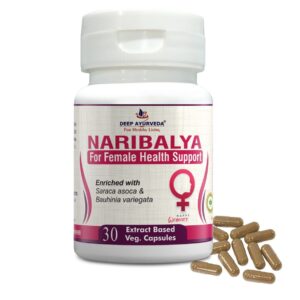 : This is a composition of the very effective Ayurvedic herbs that have been used in ancient times in the management of female reproductive health issues. The herbs like punarnava, gokshur, kanchnar possess deepan, pachan, mutral, and Vata balancing properties which effectively work in the management and reduce the growth of the cells in the endometrial cells.
: This is a composition of the very effective Ayurvedic herbs that have been used in ancient times in the management of female reproductive health issues. The herbs like punarnava, gokshur, kanchnar possess deepan, pachan, mutral, and Vata balancing properties which effectively work in the management and reduce the growth of the cells in the endometrial cells.
Nervocare Capsule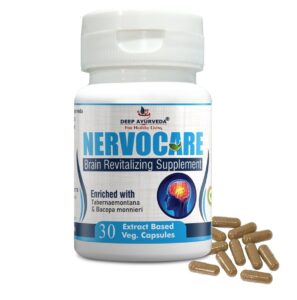 : The key herbs in the nervocare capsule are rich in antioxidants and anti-inflammatory properties that help in reducing pain, inflammation, and tenderness from endometriosis. Also, the ingredients like Brahmi, and jatamansi help in reducing stress, tensions, and anxiety.
: The key herbs in the nervocare capsule are rich in antioxidants and anti-inflammatory properties that help in reducing pain, inflammation, and tenderness from endometriosis. Also, the ingredients like Brahmi, and jatamansi help in reducing stress, tensions, and anxiety.
Kanchnar Guggul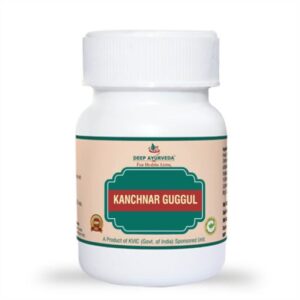 : Kanchnar guggul is very much effective in the conditions of abnormal growth and is commonly used as an Ayurvedic treatment of endometriosis for a very long time. The composition of kanchnar helps to remove the obstruction and balances the movement of Vata which further helps in managing the symptoms of endometriosis.
: Kanchnar guggul is very much effective in the conditions of abnormal growth and is commonly used as an Ayurvedic treatment of endometriosis for a very long time. The composition of kanchnar helps to remove the obstruction and balances the movement of Vata which further helps in managing the symptoms of endometriosis.
It is rich in properties like deepen, pachana, and Vata-Kapha shamak, which help in the restoration of Agni and shows its results in endometriosis.
Virog Tablet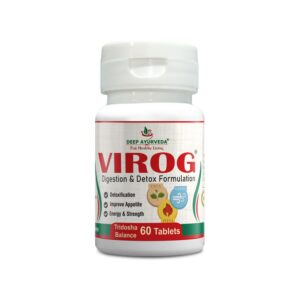 : This is the best Tridosha balancing formula comprising 10 Ayurvedic herbs that improve appetite, and digestion, and help in the elimination of harmful toxins from the body. It helps in balancing the aggravating doshas and results in reducing pain, inflammation, tenderness, and associated symptoms of endometriosis.
: This is the best Tridosha balancing formula comprising 10 Ayurvedic herbs that improve appetite, and digestion, and help in the elimination of harmful toxins from the body. It helps in balancing the aggravating doshas and results in reducing pain, inflammation, tenderness, and associated symptoms of endometriosis.
Curcumin Capsule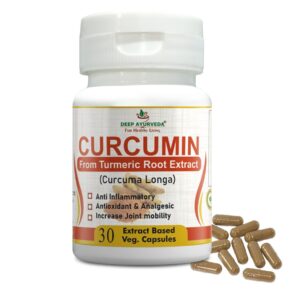 : In studies, it was reported that the curcumin capsule has the positive effects in alleviating endometriosis through its anti-oxidants, anti-inflammatory, anti-angiogenic, and anti-metastatic properties. Its active components reduce the growth of the cells in the lining of the uterus (endometrial cells).
: In studies, it was reported that the curcumin capsule has the positive effects in alleviating endometriosis through its anti-oxidants, anti-inflammatory, anti-angiogenic, and anti-metastatic properties. Its active components reduce the growth of the cells in the lining of the uterus (endometrial cells).
 Naribalaya Syrup: The key ingredients of Naribalaya Syrup provide strength to the reproductive organs and uterine muscles. The syrup helps in reducing pain, and inflammation acts as a powerful uterine tonic, maintains hormone levels within the blood, and enhances the maturation of the eggs into follicles.
Naribalaya Syrup: The key ingredients of Naribalaya Syrup provide strength to the reproductive organs and uterine muscles. The syrup helps in reducing pain, and inflammation acts as a powerful uterine tonic, maintains hormone levels within the blood, and enhances the maturation of the eggs into follicles.
As with all hormonal treatments in Modern medicines, there are many side effects like sleeping problems, headaches, hot flashes, tiredness, joint and muscle stiffness, etc. So adopt Ayurvedic herbs only as it works naturally in the management of the disease and also prevents a person from various complications.
For more detail on ‘Ayurvedic Treatment of Endometriosis’, please visit our nearest clinic, or if you want to consult with our Chief Ayurveda Consultant & Founder – Dr. Baldeep Kour then write with detailed history at info@deepayurveda.com
For regular health updates, please follow our Social Pages

